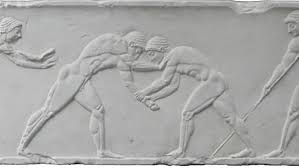[Greek] ἀθλέω (athleō), [Latin] certare: to contend, to compete, to strive, to engage in an athletic contest, to win the prize, to contend in games; 2Tim.2:5

A Greek sculpture of the gymnasium in Jerusalem during the Maccabeean era
Background Information:
Greek Hellenism: This term means to contend in battle, to engage in struggles, to contend in games, to be an athlete, and to hold games. Fitness (in body and mind) was a very highly held Greek cultural value. The gymnasium in ancient Greece functioned as a training ground or facility for competitors in the public games. Physical training and the maintenance of health and strength were the chief parts of children’s education. It was also a place for socializing and intellectual pursuits. Interestingly, the Greek term gymnos means naked. Plutarch’s Demetrius 5 states, “So the continuous wars which the successors of Alexander waged against another were aggravated and more inflamed in some cases by the close proximity of interests of territories. Plato’s Laws 830a states, “Aren’t they athletes in the greatest of contests, in which they are confronted with tens of thousands of competitors?” Oedipus at Colonus 564 states, “I myself also was reared in exile, just as you, and that in foreign lands, I wrestled with perils in my life like no other man.”
Old Testament culture: This term is found in the apocryphal book 4 Maccabees, pertaining to the conflict of martyrs. 4 Maccabees, a synthesis of Hellenistic and Jewish thought, presents suffering and martyrdom as vicarious (beneficial) for the Jewish nation as bringing atonement for the past sins of Jews. 4 Macc.17 presents the picture of the tyrant as the antagonist, and the world and the human race as the spectators. Reverence to God (victory) and the crown was given to these victors (martyrs). The tyrant himself was impressed by the endurance of these martyrs. The writer of this book believed in the immortality of the soul which would live forever in happiness with God.
2 Maccabees: Antiochus Epiphanes, a brutal Greek tyrant, persecuted the Jews. This event precipitated the Maccabeean revolt. Jason obtained the high priesthood by corrupt means. In his attempts to introduce foreign Greek Hellenistic customs, he established a gymnasium and youth center near the Temple. Jason hoped that the priests would neglect their service in the altar and that the people would lose interest in attending the Temple. Establishing a gymnasium was a blatant challenge to Jewish standards of modesty. The gymnasium was also a place for philosophical discussion where the Jewish ways were often forgotten or abandoned. This situation becomes a lightning rod which sparks the civil war between traditional Jews and Hellenistic Jews.
When Jason received the king’s approval and came into office, he immediately initiated his compatriots into the Greek way of life (2Macc. 4:10). With perverse delight, he established a gymnasium at the very foot of the citadel, where he induced the noblest young men to wear the Greek hat (2Macc.4:12). The craze for Hellenism and adoption of foreign customs reached such a pitch that the priests no longer cared about the service of the altar. What their ancestors had regarded as honors they despised; what the Greeks esteemed as glory they prized highly (2Macc.4:15).
New Testament: This term occurs twice in one scripture passage 2Tim.2:5. Paul presents the Christian as an athlete who runs the Christian race. Discipline, proper training, exertion, and readiness for sacrifice may be needed to achieve the winner’s crown. This race to reach the finish line may require martyrdom. The Christian who stays faithful even until death achieves the ultimate victory with martyrdom. These Christians often become the saints who become the role models for us in understanding how to live the Christian life. Years later St. Ignatius will also refer to the faithful Christian as an athlete tested by battle and conflict.
Scripture:
“Similarly, an athlete cannot receive the winner’s crown except by competing according to the rules.” 2Tim.2:5
Paul presents the Christian as athlete who must be trained, fit, and able to lead the Christian path.
Conclusion:
Athlete, athletics, certain, certify
It was interesting to discover that that term appears more broadly than just athletics or sporting competitions. In fact, this term applies to all walks of life, involving warfare, trials, and struggles. However, this does not take away from the fact that athletic fitness was very important for the instruction of children. These activities occurred in the gymnasium. It is also interesting to note that the Greek gymnos means naked (as illustrated by the photo above).
It is significant to note that the apocryphal book 4 Maccabees begins to develop the theology of the soul’s immortality and martyrdom (the willingness to maintain ones belief system even to the point of death). However, one must also recognize there existed ideological zealotry. Sometimes the distinction between doctrinal faithfulness and zealotry may or may be blurred.
It is important to understand that the Hebrew (Jewish) culture often had great difficulties accepting Greek Hellenistic cultural practices in Jerusalem. In other parts of the world, Jews were more easily able to becoming Hellenized. Placing a gymnasium next to the temple was a blatant attempt to subject the Jews to Greek practices in Jerusalem. This event in part leads to the situation for the Maccabeean revolt. (One would would never have thought that building a gym (athletic center) would become a precipitating factor in going to war with the Greeks.)
Paul likens the Christian path as a race with a final destination. The Christian, who faithfully follows this path, receives the victor’s crown. It is also interesting to note that the Christian martyr’s bones were often called trophies. So it is not surprising that martyrs and saints were often seen as icons of morality and virtue. Churches were often built upon the bones of martyrs.
Who would have thought that building a gym would not be fitting!
